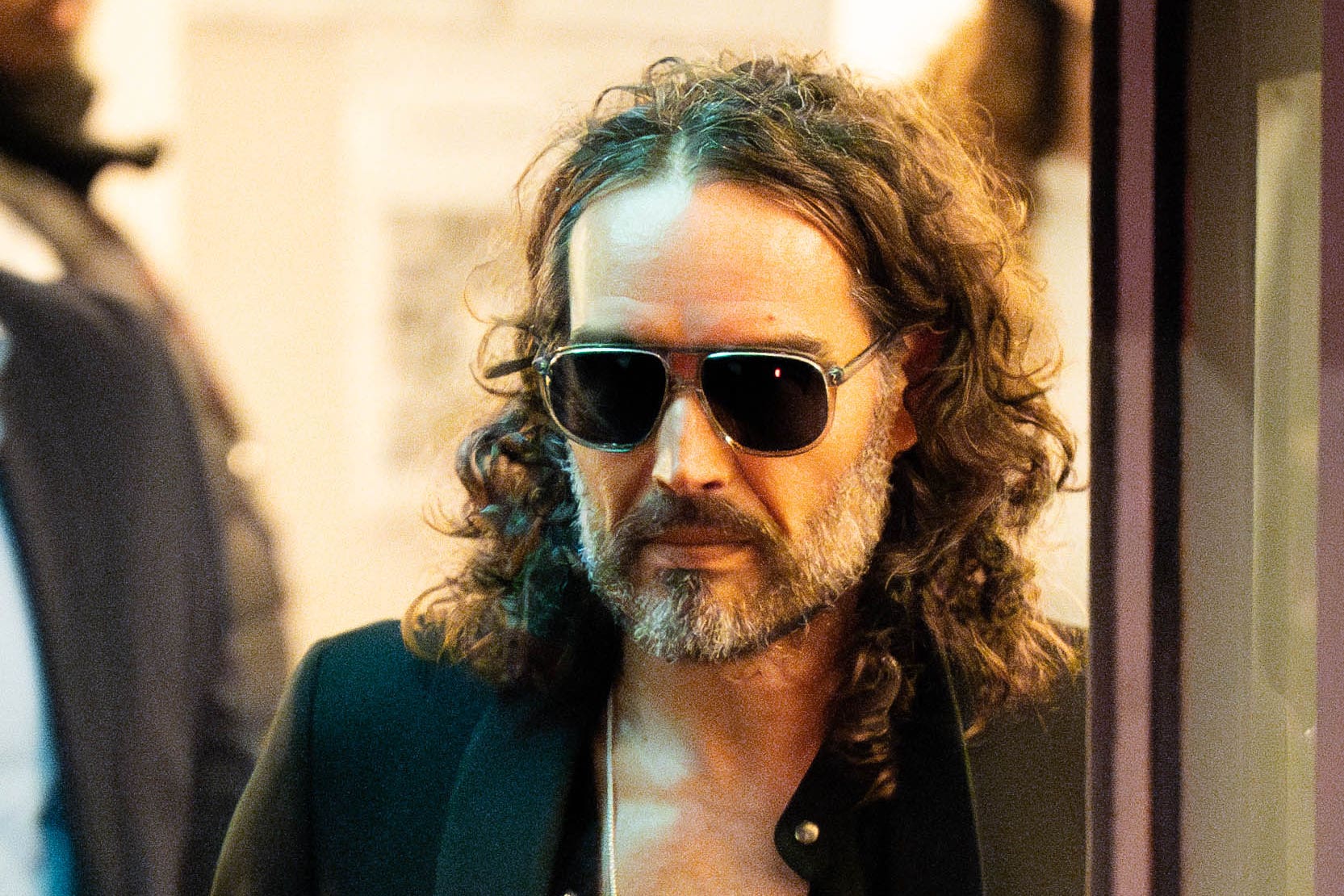Gen Z boys have a new hero in their sights and his name is Russell Brand
As ‘Adolescence’ sparked a new conversation around the manosphere, there was one person who was broadcasting why it was an insult to masculinity. Chloe Combi looks at how Russell Brand could soon be taking Andrew Tate’s crown among young men and why being charged with rape is only adding to his appeal

Three years ago, when I was in Texas at SXSW, just before Twitter became X – and ironically became inhabited mostly by Russell Brand fans – I fired off a tweet late-night by Texas time. It said: “People being surprised Russell Brand is basically Joe Rogan dressed as Jack Sparrow at a wellness retreat, clearly haven't been paying attention. He began his commentary career advising kids not to vote – reflecting his really shaky grasp of how power works.”
I woke to discover it had gone viral. The tweet got a lot of love, but also a lot of hate that was nasty and occasionally violent. Among some of the more unpleasant comments were some truly head-scratching conspiracies: I was a government shill, a man-hater, a Commie, a Nazi (difficult to be both), and far too stupid to understand the complex genius that is Brand.
While I wasn’t particularly bothered by the ire, I was more interested in two things. The first was how 99 per cent of the comments came from young guys and secondly, their outrage appeared to be quite genuine: I had insulted their guy, and their guy was someone who knew stuff that was important – and how dare I question him!
In the three years that have passed since then, the mostly young, male popularity cult around Brand has only grown. Being charged with one account of rape, indecent assault, oral rape and two counts of sexual assault, as he was at the end of last week, is unlikely to change that.
Brand has millions of followers on various social media platforms and has amassed billions of views. Over time he has evolved (or re-Branded, as it were) from someone who talked about politics (which he wore lightly), celebrity and addiction (which he writes about very well) to a much fringier voice.
He figured out early on that there was real bank to be made and eyeballs to be captured in conspiratorial content and his opining on everything from lab leaks in China to the dastardliness of Bill Gates has both swelled and horse-shoed his popularity. His Rumble channel has grown to over 2 million followers and the anti-government, anti-vax, and anti-establishment messages pushed by him are received sympathetically by the hard right, crunchy left and libertarians.
Ideologically he’s hard to pin down – and so is his audience – except for one thing: they seem to lean heavily male and quite young, mostly Gen Zs and millennials.
James, 21, is fairly typical. His politics are new right, but he wouldn’t vote for current Labour or Conservatives. He also likes the boldness of the Maga movement and says: “I love Russell Brand. He’s a bit mad, but he makes a lot of sense, and he makes you think about the world – it’s why the establishment hates him. He’s calling them out intelligently and they don’t like it. He kicks up not down, so he’s brave.”
So how did this once tabloid “shagger of the year”, presenter of Big Brother’s Big Mouth and actor in a peculiar hodgepodge of films become so sacrosanct in the heavily online bro-world?
.jpeg)
The “anti” stuff is important. There is a deep well of anger, dissatisfaction and rejection of the establishment in young men across the socioeconomic spectrum, many of whom believe the establishment has busied itself raising other groups at the expense of them. This has cultivated a real nihilism in a lot of young guys, which is as evident among Gen Z as it was among Gen X in the Nineties. The difference is that Gen X had Douglas Coupland to capture the mood, whereas now there is the internet.
Brand’s anti-system, anti-establishment rhetoric chimes with this new mood, but it also does two other important things: it both fuels it and acts as a balm for the hurt. Brand’s message is “the system is against you” but also “none of this is your fault – the system is too powerful” – and if you are angry at the world and/or feel let down by that system, this messaging is manna from heaven and binds Brand’s young, male followers to him both intellectually and emotionally.
Brand also flirts with – but never commits – to misogynistic messaging. Unlike his online contemporary, Andrew Tate, who will go full-on pull a machete in a misbehaving girl’s face, Brand will call Rachel Zegler “haughty”, which is a codified wink that she’s got above her station and will certainly add fuel to the fire under her feet.
This puts Brand in further intimate kinship with his audience, as he’s always done a kind of nudge-nudge-wink-wink at some of his darker impulses – and he’s inviting his male audience to do the same.

Taking on the subject of Adolescence, he frames the drama as a story that is the symptom of a culture that demonises men and masculinity and doesn’t understand the world of sex is “complicated”, nor that “sexuality is nuanced and complex”. He says we are living in a time when “masculinity” itself is being put on trial and any male archetype or cultural figure that benefits from the flow from that will be “vilified and attacked”. Why has Britain, he asks, gone crazy over Adolescence? “Because Britain has gone crazy full stop”, is his conclusion.
This week he turned his musings to the serious charges he is now facing. This was framed in the context of a time when he was living “giddy hedonistic days, part of a culture of casual godlessness, a world captured by a kind of darkness”. In full denial mode, he asks his audience to watch to see how the legal system works and for any links between the judicial system and legacy media – firmly casting himself in the role of “victim” of the establishment – whatever happens. His devoted “true believer audience” are with him all the way.

Brand’s identity has always been his defence. When he was a darling of the Soho House set his leather trousers and leery not-quite-rape-jokes were his defence – that was just Russell being Russell – and he was rewarded amply with columns, TV show appearances and then film roles (where he mostly played a version of himself, nudge-nudge-wink-wink).
Brand married Laura Gallacher, the sister of television presenter Kirsty Gallacher in 2017 and they live in Henley-on-Thames with their three children. During this time he’s become the darling of the online manosphere and his “the establishment is out to get us/trust no one” will shield him from any kind of accountability from his devotees and likely raise his credibility. If you build your brand on a suspicion of any kind of institution, whether it’s media, law, science or societal norms, that’s a pretty good alibi when those very institutions come knocking for you. And that is already Brand’s defence – with a bit of newborn Christianity thrown in for good measure.
Sebastian, 22, who describes his politics as “very left” (he likes Bernie Sanders and AOC), says: “Do I think Russell Brand is an angel? No. But he’s admitted to that. He’s shagg**half of London in his wild days – and so what? It’s all a bit convenient he’s suddenly a rapist when none of this came out before when he was having lunch with Ed Miliband, but now they’re after him because he’s criticising the people who used to love him.”
Gurus, cults and extreme ideologies don’t tend to work on people or indeed countries that are fairly happy, balanced and solvent. The reason Trump, Tate, Tucker and indeed Brand have been so successful over the last decade is they are speaking to (and exploiting for all its worth) a system that isn’t working for many, and, perhaps most of all, for young people.

Expensive college and university degrees aren’t delivering those promised jobs, house ownership unless you have family money is out of reach and even dating and relationships are a bust because Tinder doesn’t seem to be producing the loves of young lives, and even when love is found, how do you make an adult life from your childhood bedroom?
When you feel worn down by “the system” before you’ve even begun, people with easy answers and easy scapegoats for those problems become attractive. Brand’s conspiratorial advice to “stay free” and be an “awakened wonder” isn’t much more substantial than a “live, laugh, love” poster, but dodgy messages and messengers acquire serious power when the system that these characters rail against can’t clearly show how they can offer you something better.
If mainstream politicians and media want to pull the microphone and attention back from the cranks, crazies and chancers, they have to say to young people in particular we see you and we’re doing something effective about your needs – services, jobs, housing, health, education – and really mean it.
Unless they do, bad messengers and messages aren’t going to go away - not even when they are jailed, deported or charged with serious crimes. To their fans, this is all just proof of the big conspiracy they have been warning about all along. One commentator on Brand’s latest Rumble diatribe was fairly typical of who they saw as the true victims: ”Trust in God, not the court system. They're out to get you, my friend.”

_n_S1_E1_01_01_42_12.jpeg?quality=75&width=230&auto=webp)
Join our commenting forum
Join thought-provoking conversations, follow other Independent readers and see their replies
Comments